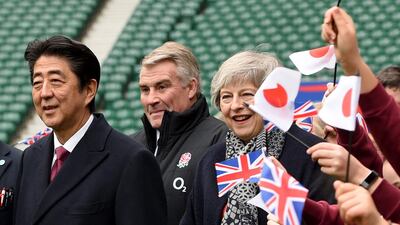Theresa May is planning to give parliament just 90 minutes to debate an alternative route to the British exit from the European Union, an official said on Thursday as fears grew over the risks posed by political deadlock over the deal.
Parliament has moved to take control over the shape of Brexit currently scheduled for the end of March. The loss of control over the process by the government has increased the odds that Brexit could be postponed, adding to economic uncertainty, or could be pre-empted by a general election.
Following defeat on a vote that set a three day deadline for Mrs May to propose an alternative if the Withdrawal Agreement she sealed with Brussels is defeated on January 15, Mrs May said a so-called Plan B motion would be tabled on Monday, January 21.
Sterling fell on the foreign exchanges on Thursday as uncertainty grows over how the crisis can be resolved. Traders said the range of negative outcomes was growing, weighing on the already beleaguered currency, which fell to $1.27.
_______________
Read more:
British ‘yellow vest’ protesters abuse MP and journalists outside Parliament
Theresa May loses her first Brexit vote of 2019
Election threat rises as May sets Brexit vote for 15th
Lorries take part in planned traffic jam as UK prepares for no-deal Brexit
_______________
Meanwhile the Labour leader Jeremy Corbyn used a keynote speech in northern England, a stronghold of the movement to leave Europe, to demand a new election.
The opposition leader is threatening a confidence vote in Mrs May's minority government if she loses the vote. He said his party would fight on a manifesto promise for a negotiated Brexit. He added that could mean an extension of the Article 50 provisions for leaving the EU if it came to power.
“An extension would be a possibility because there needs to be time to negotiate” with the EU, Mr Corbyn said. A newly elected Labour government would be “right against the clock.”
Downing St hosted the Japanese prime minister Shinzo Abe, who was given a lunch of roast beef stuffed with treacle, on Thursday, hoping to shore up support from a key investor. The Japanese leader has warned that a no-deal Brexit would destroy European supply chains and trigger an exodus of Japanese industries.
At a joint press conference with Theresa May, Mr Abe expressed "total support" for the deal Ms May has negotiated.
"We truly hope that a no-deal Brexit will be avoided, and in fact that is the whole wish of the whole world," he said.
The two leaders said they had agreed to build on Japan's deal with the EU to create an "ambitious bilateral arrangement" post-Brexit.
“It is the strong will of Japan to further develop this strong partnership with the UK, to invest more into your country and to enjoy further economic growth with the UK" said Mr Abe.
In the latest set-back for Mrs May, moderate cabinet ministers such as the business secretary Greg Clark have hinted at resignation should the government end up presiding over a no-deal Brexit.
“We need to act to avoid a no-deal because I don’t think there is anything remotely like a majority in Parliament that will tolerate this,” he said.
What the government will do next if -- as expected -- she loses the crucial vote will be determined by the crisis atmosphere in the aftermath. A string of amendments could emerge for a second referendum or in support of a Norway-style alignment with the EU single market and customs union.
For the pound the big concern in the meantime is that the hard-Left Labour leader could take advantage.
"The idea that we could have a Corbyn government, with nationalisation policies that could mean more borrowing, a more expansionary and populist fiscal stance would be negative for the budget deficit and therefore for the pound," said Jane Foley, a Rabobank strategist.
"Although the threat of a messy Brexit has been around for a while, it starts to become far more tangible when you see data like this," she added.


